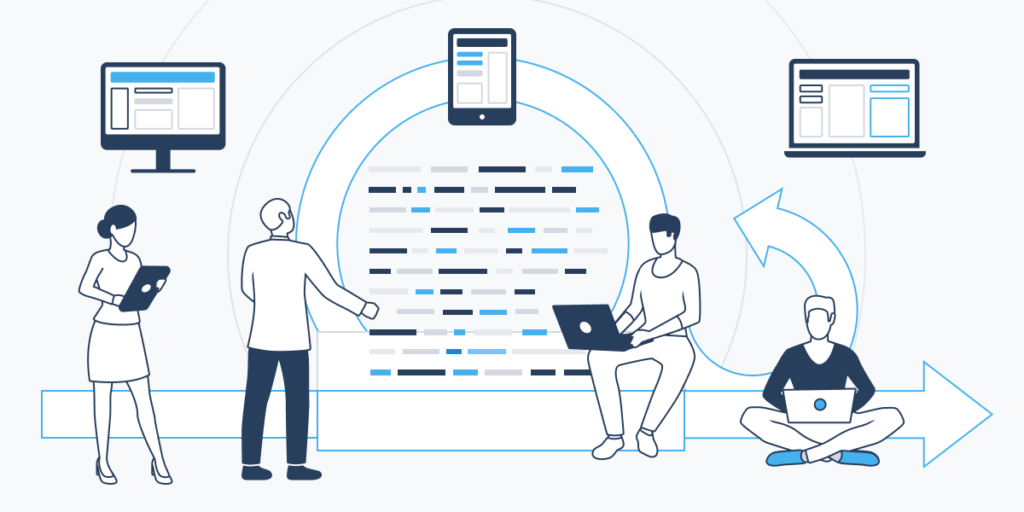Entering the world of software development can be exciting yet overwhelming, especially with the vast amount of information and resources available. For beginners, it’s essential to start with a structured approach and focus on foundational skills that will set you up for long-term success. In this article, we’ll discuss seven essential tips to help you become proficient in software development, from choosing the right programming courses to building practical projects.

1. Start with the Basics: Choose a Beginner-Friendly Language
For any aspiring developer, the first step is to learn to code in a language that’s beginner-friendly and widely used in the industry. Python is an excellent choice for programming for beginners because of its straightforward syntax, making it easy to read and write. Python is versatile, applicable in web development, data science training, automation, and more, which makes it an ideal language for beginners to start with.
Other beginner-friendly languages include JavaScript for web development and Java for those interested in object-oriented programming. Once you’re comfortable with the basics, you’ll find it easier to pick up additional languages and delve into advanced coding concepts.
2. Enroll in Structured Programming Courses
While self-study is possible, enrolling in programming courses or online IT courses can provide a solid foundation. These courses offer structured lessons, covering core topics like algorithms, data structures, and object-oriented programming, which are essential for software development. Platforms like Coursera, Udemy, and Codecademy provide courses tailored to beginners, making it easier to follow a step-by-step learning path.
For a more immersive experience, consider a coding bootcamp. Bootcamps are intensive, project-based training programs that focus on equipping you with job-ready skills in a short period. They’re ideal if you’re serious about accelerating your learning and are willing to invest both time and effort.
3. Practice Consistently with Coding Tutorials
Learning to code is like learning a new language—it requires consistent practice. To retain concepts and build confidence, practice coding regularly through coding tutorials. Tutorials are beneficial because they provide examples and guided exercises, allowing you to apply your knowledge in real-time.
Websites like LeetCode, HackerRank, and freeCodeCamp offer a range of tutorials and coding exercises for beginners to advanced coders. Completing challenges and following tutorials consistently will help reinforce your knowledge and improve your problem-solving skills.
4. Understand the Importance of Version Control
Version control is a crucial skill in software development that enables you to track changes in your code, collaborate with others, and revert to previous versions if necessary. Git is the most popular version control tool used in the industry, and GitHub is the platform where developers can store and share code repositories.
Learning Git and GitHub is essential if you want to work in software development, as it’s commonly used in software engineering roles. There are many tutorials available that teach Git basics, including how to initialize repositories, commit changes, and collaborate with other developers. Understanding version control is a fundamental skill that will serve you well in team environments and collaborative projects.
5. Build Real-World Projects
As you progress in learning to code, one of the best ways to reinforce your skills is by building real-world projects. Projects allow you to apply what you’ve learned, tackle challenges, and create a portfolio that showcases your abilities to potential employers. Start with small projects like a personal website or a to-do list application, and gradually move to more complex applications.
Building projects not only helps solidify your understanding but also provides a portfolio that you can show to prospective employers. Many online IT courses include capstone projects as part of the curriculum, giving you a structured way to build hands-on experience. A strong project portfolio can make a significant difference when applying for your first job or internship.
6. Focus on Problem-Solving and Algorithmic Thinking
Problem-solving is at the heart of software development. To become a proficient developer, it’s essential to develop strong problem-solving skills and understand basic algorithms. Many IT certifications and tech skills training programs emphasize algorithmic thinking, which is critical for understanding how to approach and solve coding problems effectively.
Start by learning common algorithms and data structures like arrays, linked lists, stacks, and queues. Familiarize yourself with search and sort algorithms, as these are fundamental concepts that come up frequently in programming interviews and real-world coding scenarios. Practicing coding challenges and engaging with algorithm tutorials on sites like LeetCode or HackerRank will help strengthen these skills.
7. Seek Out Mentorship and Join Coding Communities
Learning to code can be challenging, and one of the best ways to overcome obstacles is by connecting with others. Mentorship and peer support can make a significant difference in your learning journey. Joining coding communities or seeking mentorship from experienced developers provides valuable guidance, answers to questions, and encouragement when facing challenges.
Communities like Stack Overflow, GitHub, and Reddit have active developer communities where you can ask questions, find resources, and connect with others. Additionally, many coding bootcamps offer mentorship as part of their programs, helping beginners gain insights from professionals in the industry.
Bonus Tip: Never Stop Learning
The tech industry is constantly evolving, and new programming languages, frameworks, and tools emerge regularly. To stay competitive, adopt a mindset of continuous learning. After mastering the basics, consider exploring specialized fields like data science training or cybersecurity training. Learning new technologies and refining your skills will not only keep you up-to-date but also open new career paths within software development and beyond.
Many IT certifications and advanced courses are available to deepen your expertise in fields like software engineering, machine learning, and web development. This commitment to ongoing learning is crucial for thriving in a field as dynamic as software development.

Your Journey to Mastering Software Development
Mastering software development doesn’t happen overnight, but with dedication and consistent effort, you can build a strong foundation in just a few months. Start with the basics, enroll in structured programming courses, and practice regularly through coding tutorials. As you progress, focus on problem-solving, build projects, and leverage community support to enhance your learning experience.
Whether you’re aiming for a career in software engineering, web development, or a specialized area like data science, these essential tips will help set you on the right path. With the right approach and resources, you’ll be well-equipped to turn your coding aspirations into reality.



